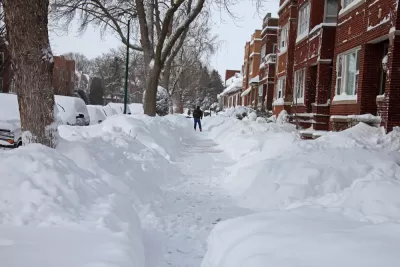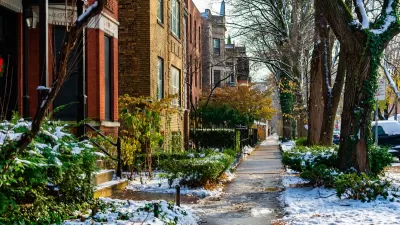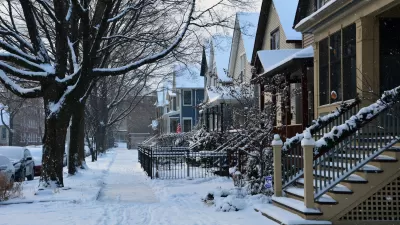Keeping sidewalks free of snow has historically been the task of adjacent property owners, forcing pedestrians and people with mobility challenges to navigate a patchwork of conditions. A new ordinance would place the responsibility on the city.

The responsibility for keeping Chicago sidewalks clear of snow and ice could shift from property owners to the city, if an ordinance proposed by Alderman Gilbert Villegas is successful in the city council. Kayleigh Padar describes the ordinance’s path to council in Block Club Chicago.
The ordinance is supported by more than 20 advocacy organizations including the AARP and disability rights groups. “Snow can make sidewalks dangerous for people with vision impairments who rely on walking sticks, for people who use wheelchairs or other mobility aides, for travelers with luggage and for parents wrestling strollers around snow, advocates said.”
Despite hefty fines for not clearing sidewalks, Ald. Villegas said that many sidewalks remain covered in snow, impeding mobility for the city’s pedestrians, particularly people with disabilities. Prior programs designed to help keep sidewalks clear failed, in part due to a lack of volunteers and resources. “The ordinance would prioritize providing services in systemically divested areas, particularly those with high population density and lots of vacant properties. Areas with lots of young families, older people and disabled people will also be prioritized during the pilot program, officials said.” Advocates say it’s important to view sidewalks as an integral part of a city’s transportation infrastructure, like roads, and ensure safe access to them year-round.
FULL STORY: Proposed ‘Plow The Sidewalks’ Ordinance Would Task City With Clearing Snowy And Icy Sidewalks

Planetizen Federal Action Tracker
A weekly monitor of how Trump’s orders and actions are impacting planners and planning in America.

Chicago’s Ghost Rails
Just beneath the surface of the modern city lie the remnants of its expansive early 20th-century streetcar system.

San Antonio and Austin are Fusing Into one Massive Megaregion
The region spanning the two central Texas cities is growing fast, posing challenges for local infrastructure and water supplies.

Since Zion's Shuttles Went Electric “The Smog is Gone”
Visitors to Zion National Park can enjoy the canyon via the nation’s first fully electric park shuttle system.

Trump Distributing DOT Safety Funds at 1/10 Rate of Biden
Funds for Safe Streets and other transportation safety and equity programs are being held up by administrative reviews and conflicts with the Trump administration’s priorities.

German Cities Subsidize Taxis for Women Amid Wave of Violence
Free or low-cost taxi rides can help women navigate cities more safely, but critics say the programs don't address the root causes of violence against women.
Urban Design for Planners 1: Software Tools
This six-course series explores essential urban design concepts using open source software and equips planners with the tools they need to participate fully in the urban design process.
Planning for Universal Design
Learn the tools for implementing Universal Design in planning regulations.
planning NEXT
Appalachian Highlands Housing Partners
Mpact (founded as Rail~Volution)
City of Camden Redevelopment Agency
City of Astoria
City of Portland
City of Laramie





























